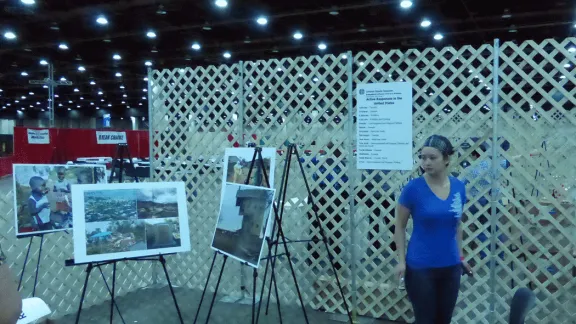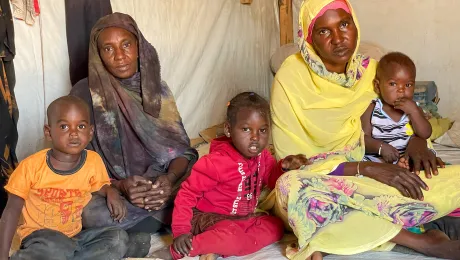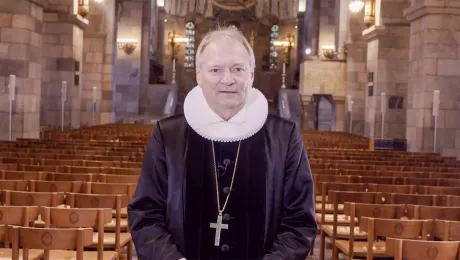
Young people are put through their paces at an ELCA refugee simulation exercise. Photo: LWF/R. Schlott
Simulated refugee experience “life changing”
DETROIT, United States/GENEVA, 23 July 2015 (LWI) - One minute they were ordinary American young people, the next they were forced to make life-changing decisions as refugees in a simulation exercise.
Among the array of events at this year's youth gathering of the Evangelical Lutheran Church of America, young people were offered the chance to experience life as a refugee.
From 15 to 19 July, more than 30,000 young visitors attended the national gathering, which is held every three years. This years event took place in Detroit, with the theme "Rise Up Together". Young people, adult leaders and volunteers came together for worship, service, fellowship, study and leadership development. A total of 40 international global participants from across the LWF communion also joined in.
For Lutheran World Federation (LWF) Council member Mikka McCracken, a program director for ELCA World Hunger, the gathering served as a place where young people were united in worship, active in service and encouraged to engage in conversations about the hard issues facing their communities and the planet.
One activity was a simulation in which young people were forced to flee their homes and make life-changing decisions in a matter of minutes, a situation faced by refugees the world over.
There, they learnt the hard way what life is like as a refugee.
Young people aged 14 to 20 took part in this simulation in groups of between five and 15. The aim was to give them an insight into the strenuous and hectic life of a refugee.
"A life-changing experience"
The simulation started in an ordinary living room. On the floor lay a number of vital goods, such as medicines, water bottles, birth certificates and other personal documents, money, toys, jewellery and diapers. After recordings of gunshots were played, the participants had a two-minute “grab” of essentials they would take before fleeing their homes.
They then went to the next station where another misfortune occurred. Their father was blinded by a bomb. They faced the dilemma of having to share scare drinking water with another group. The simulation took part in a deliberately noisy atmosphere to add another element of disruption.
Next, they came to the refugee camp where they had to first register before being shown to a tent. The young people were given practical information, such as how many calories they would receive in food rations each day, where the water station was and the need to befriend fellow refugees, which was a "life-saving exercise" in a camp setting, LWF humanitarian coordinator Roland Schlott said.
“Very sobering” was the reaction of many participants, said Schlott. “There were also participants who themselves had once been refugees and lived in a camp. They were very cautious."
Another young person described their participation as a “life-changing experience".
It provided young people with a very different impression of refugees and situations in which people were forced to flee their homes, Schlott said.
“Previously, they knew only the insights of refugees from the side of humanitarian workers. Many thought that a couple of days in a tent would be quite funny. That may be the case with a family outing for a few days but for refugees who have already spend several months or even years in such camps, or most likely do not even know when they will be allowed back, it is not the case.”
The simulation gave a clearer sense of the realities for people seeking refuge and might prompt young people to advocate for and donate to refugee programs, he said.
“I wanted to participate in the project because I wanted to get to know the youth, who are important for the future,” said Schlott, of his invitation to the meeting.
The church will matter into the future
An event the size and intensity of Rise Up Together indicated the Lutheran church was changing but still strong, McCracken said.
US media claims that the church was growing older and smaller were probably true but didn’t tell the entire story. “The ELCA Youth Gathering is one, highly visible way we know the church still exists and matters into the future, but also demonstrates that it may not look the same as it always has - in fact, perhaps it shouldn’t.”
As well as meeting in worship, a large proportion of the program focused on service to the city of Detroit. Each day, 10,000 young people went out in the city to work. By the end of Rise Up Together, they had painted nearly 1850 murals, boarded up 310 empty homes, cleared 3200 vacant lots of rubbish, installed 36 urban gardens and built nearly 100 picnic tables.


